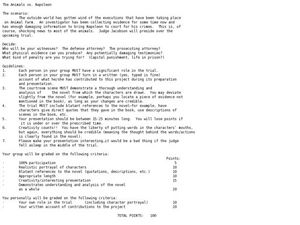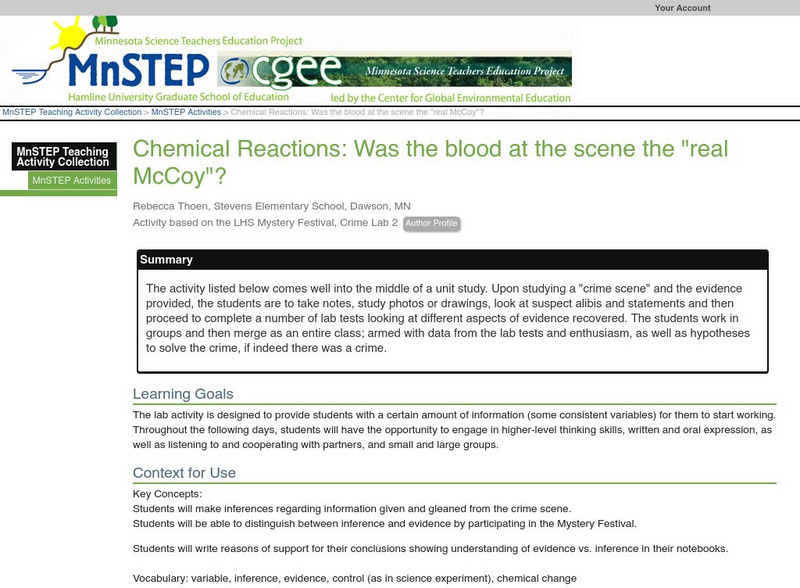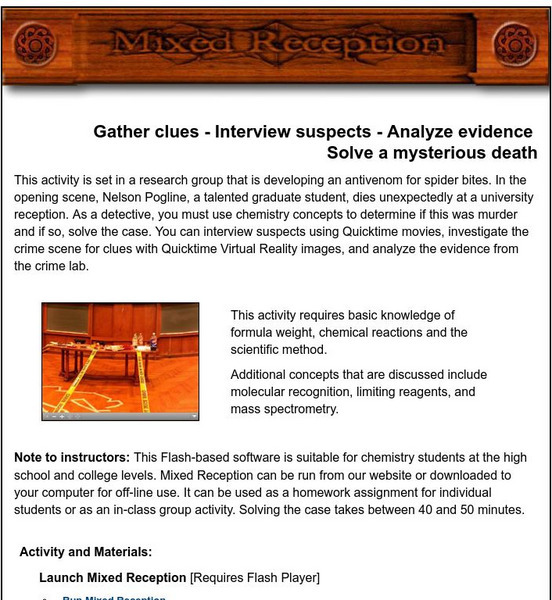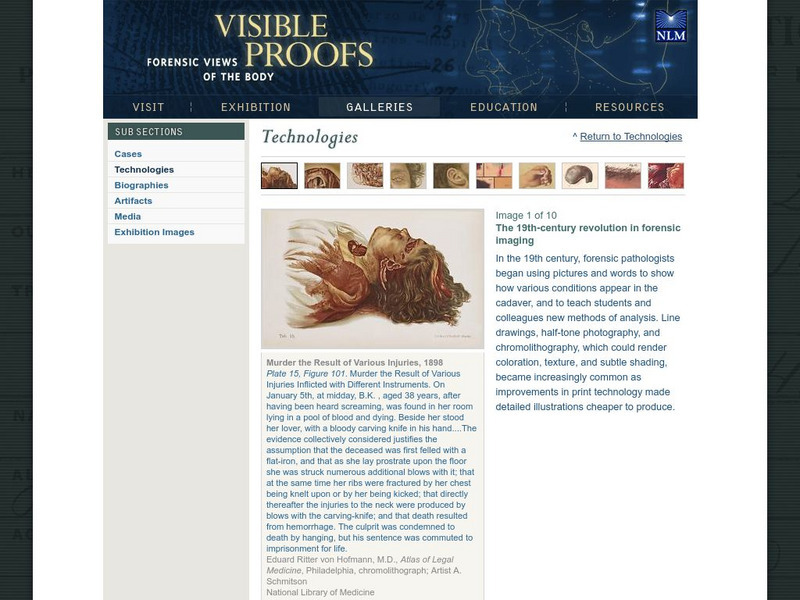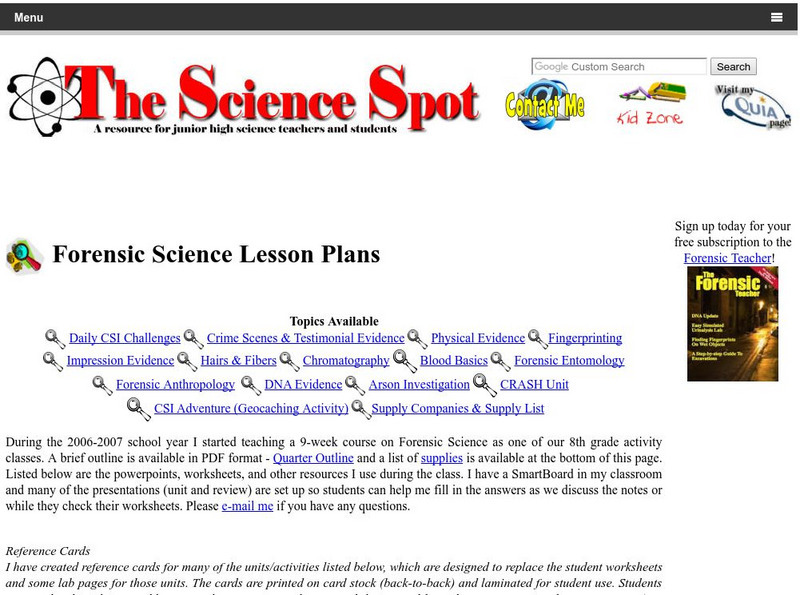Curated OER
Blood, I Presume?
Students explain the value of blood in trials. In this DNA lesson students work together to collect and share information and ideas that they come up with after learning how to distinguish blood from other stains.
Curated OER
DNA Fingerprinting
Young scholars experiment with chromatography as a technique which is similar to electrophoresis that scientists use to identify DNA samples.
Curated OER
The Animals vs. Napoleon
In this literature analysis worksheet, students read Animal Farm and complete a trial activity project based on the characters of the animals vs. Napoleon.
Georgia Department of Education
Ga Virtual Learning: Crime Science Investigation
In this comprehensive interactive tutorial you will learn the basic components of a crime scene investigation and how they are implemented. You will also learn various evidence collecting techniques, as well as how to properly document...
Other
Crime Scene Investigator: Searching and Examining a Major Case Crime Scene
An engrossing explanation of the appropriate behavior needed at a major crime scene. What should be done with the body? How is photography handled? What about fingerprinting? How are curious onlookers dealt with? The answers to the...
Other
Crime Scene Investigator: Evidence Collection Guidelines
A list of specific types of evidence that could be collected from a crime scene. Links to methods for collecting the following kinds of evidence: blood stains, seminal stains, hair, fibers and threads, glass, paint, flammable liquids,...
Other
Crime Scene Investigation: Protecting the Crime Scene
This brief but informative site examines how a crime scene should be protected with emphasis on the role of the first officer(s) to arrive. Points are made about the arrival of additional personnel, eating and drinking at the crime...
Other
Crime Scene Investigator: Practical Methods for Processing a Vehicle
Practical methods are suggested to secure and not contaminate any evidence found in a vehicle at a crime scene.
Other
Crime Scene Investigator: Developing and Lifting Footwear Impressions
A thorough explanation of how to make a footwear impression at a crime scene. Topics include equipment needed, the technique used, documentation, personal safety, and more.
Other
Crime Scene Investigation: Proper Tagging and Labeling of Evidence
What is the purpose of tagging and labeling items of evidence? What information belongs on the tag? These questions are answered in this concise but competent site.
Science Education Resource Center at Carleton College
Serc: Chemical Reactions: Was the Blood at the Scene the "Real Mc Coy"?
The activity listed below comes well into the middle of a unit study. Upon studying a "crime scene" and the evidence provided, the students are to take notes, study photos or drawings, look at suspect alibis and statements and then...
Indiana University
The Case of the Missing Computer Chip
Have your teams of students solve the simulated crime scene using clues presented in this thorough forensic lesson plan.
Science Buddies
Science Buddies: Science Fair Csi: Can You Predict the Spatter?
There is evidence to be gathered at every crime scene. The hard part is making sense of it all. That's where crime scene investigators and forensic scientists come in. In this science fair project, you will investigate blood spatter...
Cyberbee
Cyberbee: Who Dunnit?
If you are a crime scene investigation (CSI) fan, then you will love this site! You get to be the detective by examining the evidence, viewing the crime scene, dusting for fingerprints, interviewing the suspects, and solving the crime.
Indiana University
A Crime Against Plants
Have your students delve into the evidence involving a small tree and arrive at an explanation of what happened in this thorough lesson plan site. .
Chemistry Collective
Chem Collective: Mixed Reception
Participate in the investigation of a virtual crime scene using chemistry concepts to solve a mysterious death. The 40-50 minute activity can be used as a classroom lab or as a homework assignment. Additionally, teachers may request a...
National Institutes of Health
National Library of Medicine: The Bertillon System
Bertillon devised a system to make order out of the myriad of crime scene photos taken by the police. This brief site describes how that system worked and shows a number of crime scene photos taken from Bertillon's photo album.
National Institutes of Health
National Library of Medicine: The 19th Century Revolution in Forensic Imaging
In the 19th century, forensic pathologists began to use words and pictures to describe cadavers and to teach using cadavers in the classroom. See a number of interesting photos of various crime scenes on this interesting site.
TeachEngineering
Teach Engineering: Who Robbed the Bank?
Students use DNA profiling to determine who robbed a bank. After they learn how the FBI's Combined DNA Index System (CODIS) is used to match crime scene DNA with tissue sample DNA, students use CODIS principles and sample DNA fragments...
Natural History Museum
Natural History Museum: On Maggots and Murders: Forensic Entomology [Pdf]
Five-page article explains how forensic scientists, when investigating crimes, analyze maggots and blowflies to determine approximate times of death.
National Health Museum
Access Excellence: Dna Detectives
A hands-on activity from Access Excellence for advanced biology classes. Students are given a crime scenario and three suspects. Their mission is to determine 'Who Dunnit?' by obtaining and analyzing DNA samples. Requires extensive...
Chem4kids
Chem4 Kids: Chemistry Careers
Chem4Kids! looks at careers available in the large field of chemistry. Here you can explore the career of a doctor, pharmacist or pharmacologist, university researcher, forensics expert, or hazardous materials expert.
University of Missouri
Famous Trials: West Memphis Three Trials (1994)
On a warm sunny May day three eight-year-old boys set off on a bike ride around their hometown of West Memphis, Arkansas. The next afternoon, their bruised and mutilated hog-tied naked bodies were pulled from a stream, setting off an...
Other
Science Spot: Forensic Science Lesson Plans
Huge collection of teacher-created lessons, activities, PowerPoint presentations, and worksheets for classes in forensic science.




